#this is my philosophy about life
Text
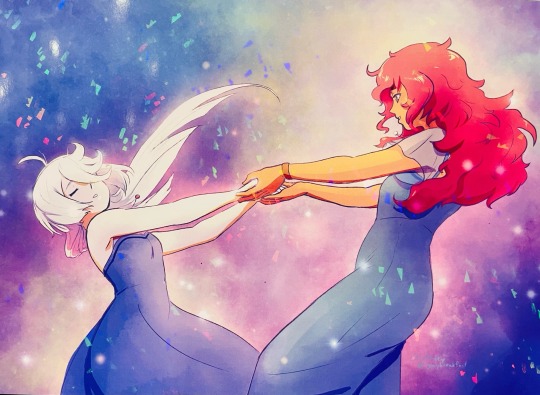
Trust
#sulemio#g witch#Suletta#Miorine#gundam#my art#I love these two as much as Rupphire. Maybe even more? Time will tell.#They are relatable in some ways that Rupphire didn’t touch on#I met my wife when I was 17 and while the scenarios we met under aren’t as intense as GUNDAM#the parallels are uncanny enough to be both nostalgic and validating#helped us recontextualize some past trauma and philosophies about healing#This changed my life as much as Steven Universe#and Sarazanmai
271 notes
·
View notes
Text
One thing that I feel is really interesting and often forgotten about Essek is that fundamentally, his characterization has been from the start based upon his desperation for external perspectives and connection, which, along with much of his narrative and mechanical positioning, means that he actually has an extraordinary and almost (but not actually, as I'll show) counterintuitive capacity for both growth and trust.
(Buckle in. This is a long one.)
In particular, I would argue, knowing now that many places where the plot touches Ludinus have long been marked for connecting back into the current plot, that he was quite possibly built as a prime candidate for radicalization by the Ruby Vanguard. He felt isolated from his culture, he was desperate for other connection, and he was certainly of the type to believe he was too smart to be drawn into such a thing, given his initial belief that he could control the situation and the fallout. If things had gone any other way, he easily could've been on the other side by now.
As such, he has been hallmarked by being fairly open to suggestion, perhaps for this reason, but the thing about that kind of trait is that it is both how people are radicalized and deradicalized. This is certainly true of Essek, who experienced genuine kindness and quite frankly strangeness from the Nein and was able to move from the isolation the Assembly had engendered to meaningful and genuine connection, largely propelled by his own internal reflection. By the time Nein are aware of his crimes, he's already begun to express regret to an extent and, furthermore, doubt in the Assembly, including explicitly drawing a line against Ludinus, even in a position where he was on his own and probably quite vulnerable.
Similarly, when the Nein reach the Vurmas Outpost some weeks later, he has moved from regret for the position he's ended up carrying a heavy remorse. This makes sense! He's fairly introspective, seems used to spending a lot of time in his own head, and was left with plenty to mull over. It's not some kind of retcon for him to have progressed well past where the Nein left him; it just means he's an active participant in the world who has done his own work in the meantime.
This is another interesting aspect to him. I've talked about this a bit before but I cannot find the post so I'll recap here: antagonists in D&D have significantly more agency than allied NPCs. Antagonists are active forces, against which the party is meant to struggle; allies are meant to support the PCs, which means they tend to be more passive in both their actions and their character growth. Essek was both built as an antagonist, in a position that gives him significant agency, and also was then given significant opportunity to grow specifically to act as a narrative mirror for Caleb's arc. Even when he becomes a more traditional D&D ally, he still retains much of that, though he occupies a supporting role.
I believe that this is especially true because of the nature of Caleb's arc, which I've already written on; the tl;dr of this post is that Caleb is both convinced that he is permanently ruined and also desperate to prove that change is possible. Essek is that proof, because he is simply the character in a position to do so. But this also means that his propensity for introspection and openness is accentuated! He has to do the legwork on his own, for the most part, because that's where he is in the meantime.
But he still ends the campaign necessarily constricted; he is under significant scrutiny, he's at risk from the Assembly, and he goes on the run fairly soon after the story ends. He spends most of the final arc anxious and paranoid, which is valid given the crushing reality of his situation. It would be very easy to extrapolate that seven years into this reality, he would be insular, closed off, and suspicious of strangers, even in spite of the lessons he's learned from the Nein and their long term exposure.
So seeing his openness and lightness now is surprising, but at the same time, given this combination of factors in his position in the narrative over time and his defining traits, it's not by any means unreasonable.
But one thing that I found so delightful is how much trust he exhibits, which is obviously a wild thing to say about Essek in particular, given much of what he learns is both earning and offering trust, which was something he says explicitly in 2x124 that he's never really experienced: "I've never really been trusted and so I did not trust." It makes up much of the progression of his relationship with Caleb, and the trust that he is offered by the Nein in walking off the ship is the impetus he needs to grow.
But I think it's easy to talk about trust when it comes to people who have proven themselves to you or to whom you've ingratiated yourself, and that's really the most we can say about Essek by the time he leaves the Blooming Grove. There is this sense in a lot of discussion of trust (not solely in this fandom) that it is only related to either naivete or love, but there's far more to it. Trust at its best is deliberate—cultivating an openness to the world at large is a great way to combat cynicism and beget connection instead. It allows a person to maintain curiosity and be open to experience, but it can be incredibly difficult to hold onto.
It is clear that the Essek we meet now is a very pointedly and intentionally trusting individual. He trusts Caleb and by extension Caleb's trust in Keyleth, as he shows up and picks up a group of strangers from a foreign military encampment and walks in without issue. He trusts the Hells to follow his lead moving through Zadash and to exhibit enough discretion so as to avoid bringing suspicion upon all of them. He trusts that Astrid will respond well to his entrance, but he also trusts himself and the Hells enough to execute a back-up plan in the case that she doesn't. In the end, he even trusts them enough to give them his name and identity.
He doesn't scan as someone who has spent half a dozen years living like a prey animal, afraid of any shadow he runs across in an alley, withdrawn into himself and an insular family, which would've been an easy route for him to take. He scans as someone who has learned the kind of trust borne of learned confidence and a trained eye for good will and kindness, which are crucial weapons one would need for staving off cynicism in his circumstances—as if he has survived thanks more to connection and kindness than paranoia and isolation. (If we want to be saccharine about it, he scans quite poignantly as a member of the Mighty Nein.)
So it is easy to imagine this trust and openness as a natural progression of his initial search for perspectives external to his own cultural knowledge. Though he makes those first connections with the Assembly to try to vindicate his personal hypotheses, he finds in them exposure to the deepest corruption among Exandrian mortals, which could've—and did, for a time—turned him further down that same dark path.
But it's also this same openness to exposure from the wider world that allows the Nein to influence him for the better, and in spite of the challenges he's certainly faced simply surviving over the past seven years, he seems to have held onto this openness enough to move through the world with self-assurance and a willingness to extend the kinds of trust and good will that he has been shown.
(I would be remiss not to mention that I was reminded about my thoughts on this by this lovely post from sky-scribbles and their use in the tags of 'light' to describe Essek's demeanor this episode, which is really such an apt word for it.)
#something something hope is a weapon hope is a discipline hope is a garden to cultivate!!!#HE'S SO GOOD HE IS TRULY EXEMPLAR OF THE WHOLE PHILOSOPHY OF THE NEIN AND I DO NOT THINK THAT'S AN ACCIDENT#truly just like. enormous proponent of letting trust and curiosity into your heart regardless of the horrors.#it's hard and it makes you more vulnerable and sometimes it hurts so so much but it will also save your fucking life!#cr spoilers#critical role#essek thelyss#cr meta#I was gonna apologize for the length but I'm not sorry. I'm also not sorry for being insane about him but he's so special to me.#head in my hands he's so GOOD HE'S BEST BOI! GUIDING LIGHT NORTH STAR!!! LOOK AT HIM!!!#also truly if i had two nickels for a span of time with no essek sightings where I wrote a lot of fic#with deliberate personal acknowledgment that I was writing some pretty maximal arcs for him in terms of character growth#and then end up getting essek for half an episode and having to go OH WE'RE GOING THAT FAR ACTUALLY. FUCKING INCREDIBLE.#yanno. two nickels. but good lord I am thriving that it's happened twice#augh this is ONE of the pieces I need to write this week. we're not gonna talk about it
340 notes
·
View notes
Text

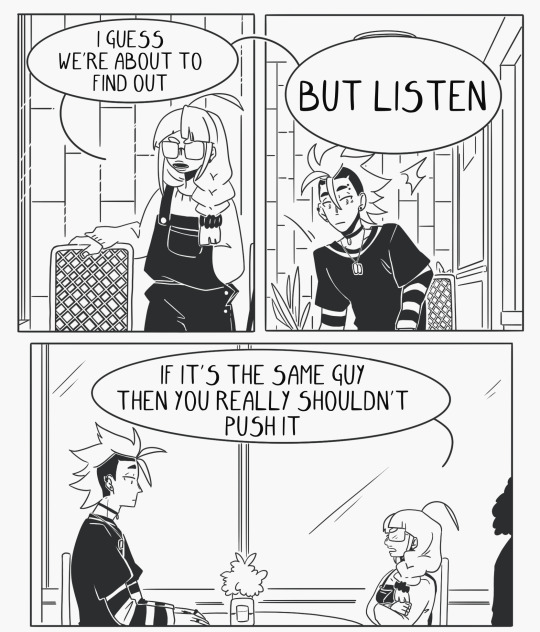
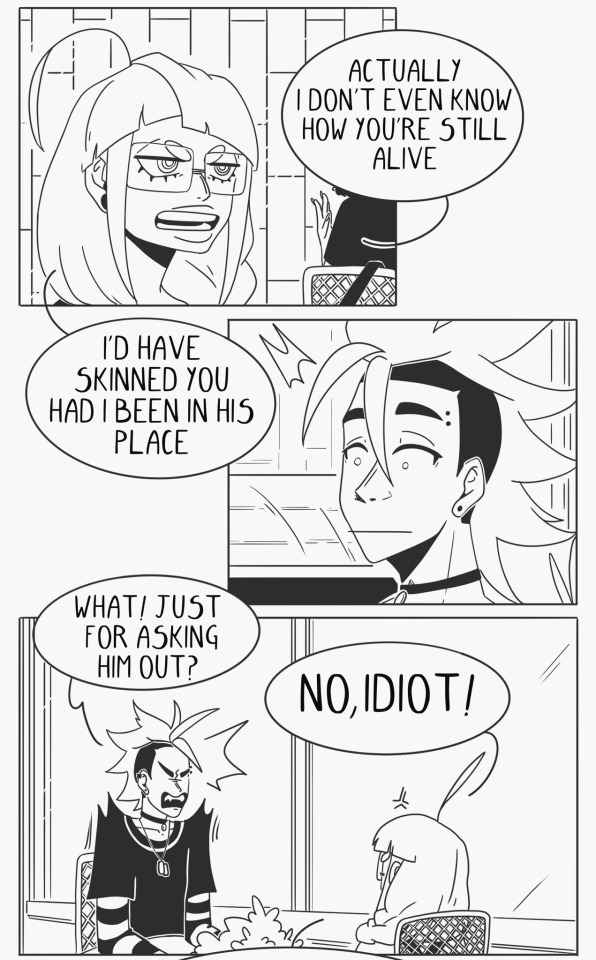
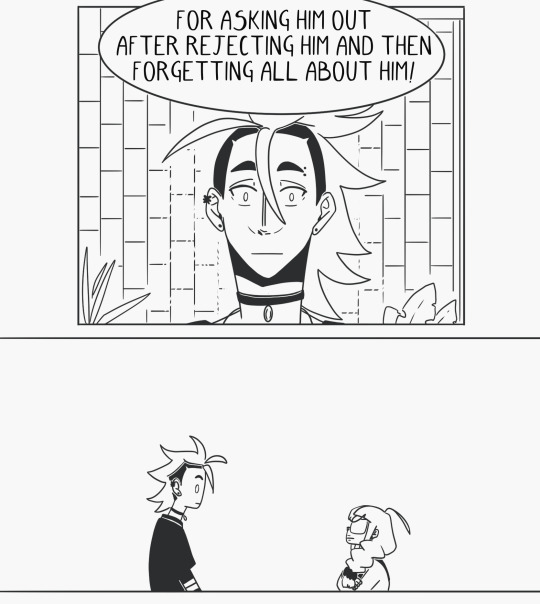
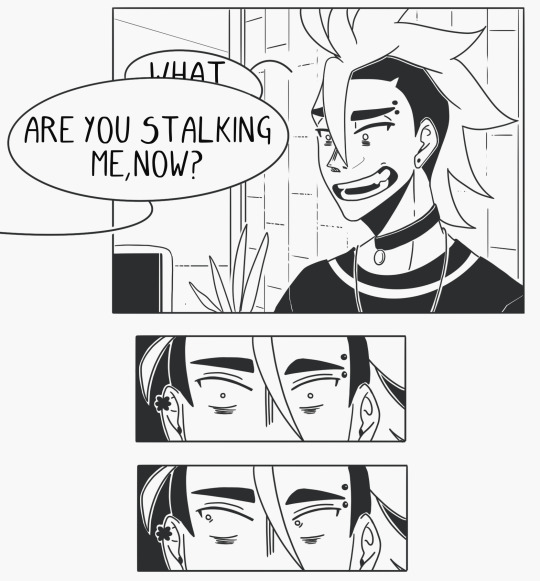
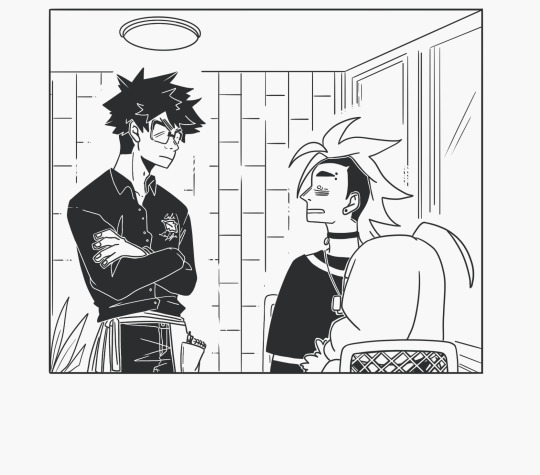
The Housecat Philosophy - Ep 45
Ep 00 || < Prev || Next >
Read ahead on Patreon || Catch up on Webtoon || support me on ko-fi~✨
#artists on tumblr#the housecat philosophy#original comic#webcomic#original art#my sketches#he’s everywhere !!!!!!!#we’ll explain why at some point dw about it#but mainly it’s just daves abysmal luck#i love to make his life harder than it needs be :)#btw guys i just realized but it’s nearly been one year since I started posting this comic on patreon !!!!!!!!!! insane !!!!!!!#and i’m just now getting close to finishing the first part of it ! i still have three characters to introduce !!!!!#this is really gonna take me a while huh#nice
340 notes
·
View notes
Text
Shinichi angst is so damn good. He's in his own body but it doesn't feel like himself. His life is "dead" even though he's alive. When he comes back he will never go back to his old self. He can go back to his body but his life will never be quite the same (for better or worse)
He was just a 17 kid who had dreams ambitions friends he had to "abandon". Imagine putting up an act 24/7 and not being truly able to say the things you actually want to. And yet- this false identity of his started to blend in with his "authentic" self.
He will have to "kill" Conan like he did with himself eventually. Like I know this this is the whole point of his character but I feel like it's easy to forget due to everything going on, and every so often I'm reminded of this and go bonkers over it. Does anyone get me 😭
#detective conan#something something about how awful it is that the bad things of life change us fundamentally. ever and always. time is always foward and we#cannot go back no matter how much we want to. but life isnt going to end over that. we gotta keep going too; and perhaps that change will#lead us to good things#man i should sleep already. it is 5 am rn lol#i expect to wake up from this philosophy induced post and cringe at it later lmao#shinichi kudo#my posts#detco#also yes shinichi trans allegory slay
144 notes
·
View notes
Text
Shoutout to one of my favorite Blue Lock beefs. No cunning, no grace, no restraint with these two. Just throwing hands ON SIGHT. God bless.
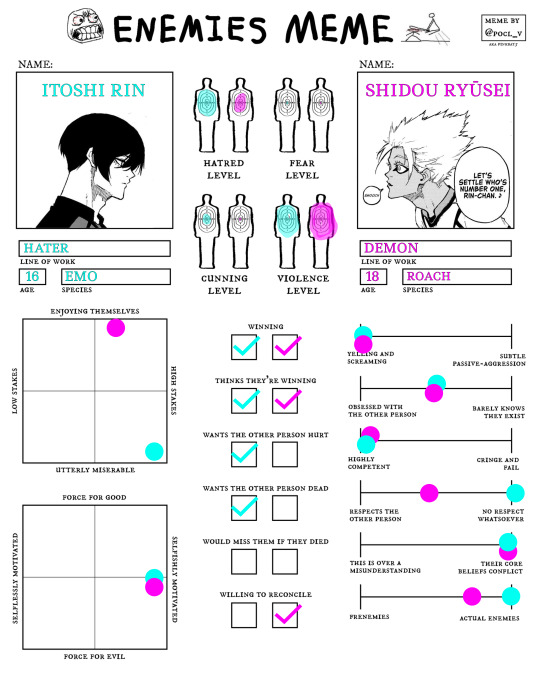
also shoutout to Shidou for being the only person who actually makes Rin lose his composure like that (and so easily too). king
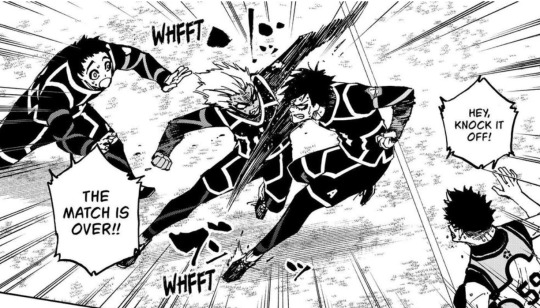


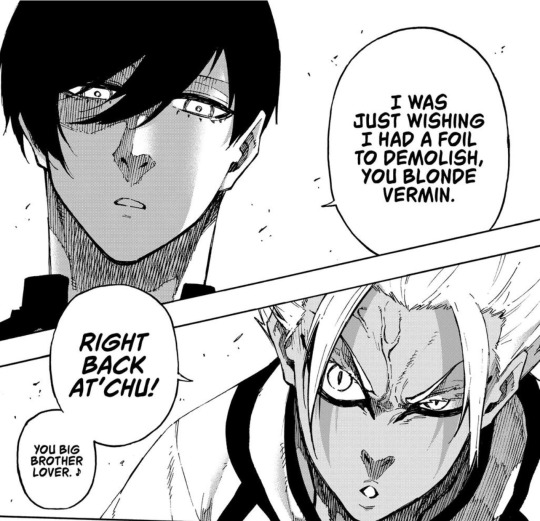
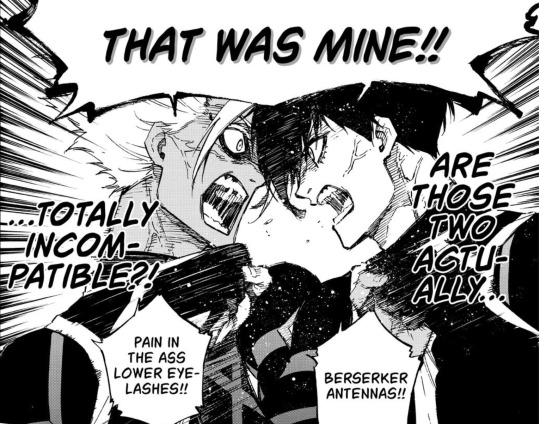
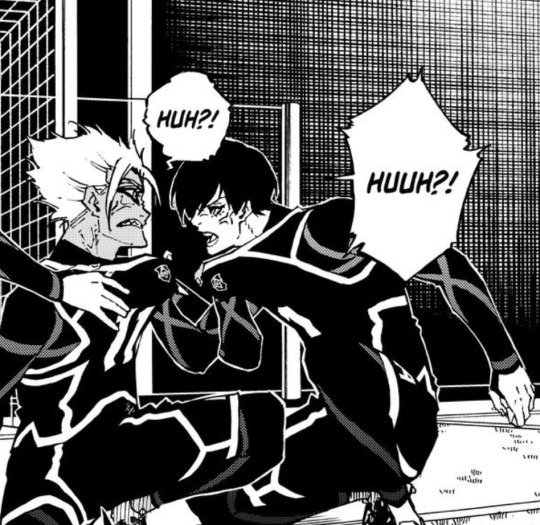
((this post by @bluelock-textposts inspired me))
#yes yes i'm making a nagi and barou one next#every time I see that panel of shidou blowing a kiss to rin that's in the meme I remeber this one tweet that's like#“rin better than me because if shidou blew me a kiss I would simply have folded right then and there”#i think shiodu likes rin actually. he's just likes to throw hands more lol#anyway I know it's all “hahaha shidou and rin beef” but also I#have a 1400 word essay sitting in my drafs about these two and how they embody the two very different philosophies that are at the core of#many of the great conflicts in this manga#and how what I believe shidou's life was like before blue lock vs rin's life before blue lock causes them to treat each other like this#and how sae comes into play and the very complicated and meaningful relationship between these three people#and what him choosing shidou over rin means in terms of sae's own character and beliefs and attidute towards the sport#and why he chose shidou even though sae clearly loves his brother and wants him to succeed (and I can't believe ppl think otherwise)#anyway#why is their fighting lowkey sexy#shidou ryusei#itoshi rin#mine
375 notes
·
View notes
Note
I liked the folk song you exposed me to. If you feel like it, the first five that hit your mind go! I'll look them up and have a listen ^‿^
Boy I wish I could remember what folk song that was ahahah. I listen to a LOT of folk. A Favored genre. I basically listen to folk and country and then running music. Bless you for not asking for me to pick songs that are my favorites or particularly great, those almost always paralyze me for whatever reason.
HERE'S THE LAST SIX I PLAYED ON YOUTUBE THAT I THINK ARE MORE FOLK THAN COUNTRY
Billy Bragg -- Between The Wars
Iron and Wine--Passing Afternoon
Dave Carter--When I Go (Doc why are there two songs in a row about death? Mind your business, if you're not careful I'll make a whole playlist of the very best of death.)
Bright Eyes-- Land Locked Blues
Trials of Cato-- Gawain
Colter Wall--Sleeping on the Blacktop
And here's three bonus "if you know nothing about folk music here's some important foundational American Contemporary Folk music that you may have never heard" songs (In MOST of these the singers are important but the songs are just, ones I like)
Woody Guthrie-- I ain't got no home in this world-- You know this dude. He wrote "This land is your land". He's the one that has the guitar that says "This machine kills fascists" (Boy whenever people post something referring to that I want to be like, "WHOSE FUCKING GUITAR IS THAT FROM??? TELL ME WHO! TELL ME NOW!"
Pete Seeger -- What Did You Learn in School Today -- you know many many songs by this man. They have been covered by many many people. he wrote "Turn, Turn, Turn" he wrote 'Where Have All the Flowers Gone" he wrote "if I had a hammer" It is BUCKWILD to me that more people don't know who Pete Seeger is. Anyway i picked this song because both he and the below are part of my larger reeducation program that all generations have been politically aware, actually.
Phil Ochs--Draft Dodger Rag-- I fucking love Phil Ochs. He was the first one, by most reasonable evidence, to publish a protest song that named Vietnam by name. He was deeply critical of the US government. He wrote my favorite patriotic song too, though. He was a biting, funny, aggressive Jewish man who started fights even within his own circles (He directly attacks Pete Seeger, I know of at least, in one song. Bob Dylan shoved him out of a limo because Phil was dogging on his songs) and did not know when to fucking quit, and got himself into trouble. I consider his suicide to be one of the great tragedies of the music world, but also not the most surprising thing on God's green and verdant earth. I could give you just a top five Phil Ochs songs. Anyway, I picked this song because everyone picks the aggro ones, but I like also when he's funny. ANYWAY.
33 notes
·
View notes
Text
i think when the doctor says stuff that contradicts their own life like "ive never been this far out" it's not lying or poor continuity, i think it's just memory
#i tell accidental lies about my own life and experiences daily#and im only 25#how the fuck is the doctor expected to remember all that#and even if theyve done it before#but dont remmeber#even if its not like evil mindwipe dont remember but just. regular. it's been 1000 years dont remember#if it feels to them like its the first time then for all intents and purposes of that line it is the first time#right?#i suppose thats up to your philosophy but according to mine#then it is the first time#also i think as a writer you have to pick and choose what continuities to honour or you'll drive yourself mad#i dont actually know if this particular one line was incorrect#i just think ive seen someone say so#but like im not actually entirely sure what the difference is between like#the end of the universe or the end of time or between universes or Whatever#so#what is 'farther out' who knows not me
38 notes
·
View notes
Text


#I’m not ace or aro but they’re so cool I think they’re right about everything#making this my pinned so everyone understands my life philosophy the moment they enter my blog#aromantic#asexual#aroace
31 notes
·
View notes
Text
You guys STILL think it was 'ooc' for Ichigo to not join the Soul Society?You do know that SS is a military/cop state and that he's literally a punk right?????

#and i don't mean 'oooooh edgy boi' punk i mean he actively rebels against corruption and helps out people in need and hates authority#it's not him being quirky it's his life philosophy-yes he's goth too but that's about his aesthetic and interests#and he's not gonna give up his beliefs to date someone because again HE'S AN ACTUAL PUNK.you shouldn't take that away from him over a ship#the lack of radicalization in the bleach fandom is weird to my pastel punk ass.why can't y'all be more like the naruto fans with braincells#ichigo kurosaki#ichihime#orihime inoue#kazui kurosaki#rukia kuchiki#pro ichihime#pro orihime#pro ichigo kurosaki#pro kazui kurosaki#t4t ichihime#antiichiruki#anti soul society#bleach#💌#letters from summer
50 notes
·
View notes
Text

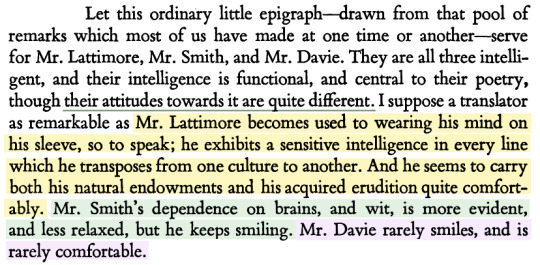
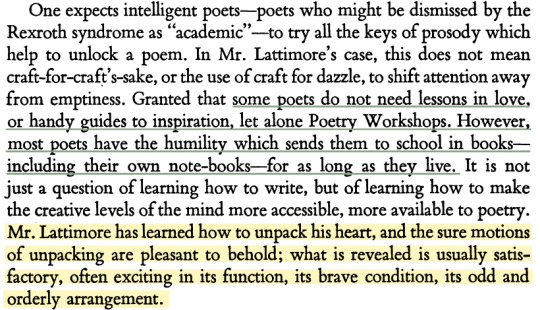


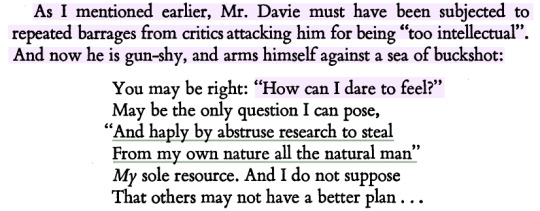
— The Uses of Intelligence, by Caroline Kizer, 1959.
#I really loved this one... gave me such a more fond and expanding perspective of intelligence.#One of my favorite things I've read this month.#So many intellects exists; and yet their attitude towards it can entirely rearrange what intelligence even means-#-and how it takes form. Either in their life or to them or their work and arts. Etcetera...#I've never really thought about intelligence within the context of your attitude towards it and how you specifically equip it; we're sort-#-of taught that intelligence is amalgamated all into this one thing but it's often much broader than that in practice.#And that's just so fascinating... WHATTT!#poetry#the uses of intelligence#caroline kizer#the poetry foundation#quotes#excerpts#words#philosophy#writing#intelligence#poetry on tumblr#poetry on intelligence
21 notes
·
View notes
Text
Moral Orel hit me in a sweet spot. I think it’s beautiful seeing fans on different paths discussing how the show touched them. I’ve seen people who’ve left the church, agnostics, atheists, and Christians all say the show spoke deeply to them. Of course the show’s black humor on religion offended many, especially before its last season aired, but I think the show’s resulting legacy - connecting to people who’ve both left and who’ve stayed - demonstrates successful nuance to how Moral Orel was crafted.
The show’s creators have said it’s not against religion per se, it’s against hypocrites. Even with the first season, I felt that and found appreciation (frankly, joy) for what was satirized. Here was a show speaking up, exaggerating, and lampooning the facets of Protestant American Christian culture I’ve vented about in confidence to relevant friends and family - without, like many modern shows which tackle this subject do, mocking followers themselves, faith itself, and suggesting to viewers one way of life is better than another, one group of people is (ex: intellectually) superior to another.
Some people have stepped away from Moral Orel and said, “This show comforted me when I left church,” or outright, “This show taught me there is no god.” And that’s not an unfair way to interact with Moral Orel because it doesn’t preach what you “should” do there (a sign of mature writing, really). I stepped away from Moral Orel and said, “This show comforted me in the areas I get frustrated,” which assuages my feelings and makes me more confident in my faith and place within culture.
I feel awkward in contemporary culture because I was raised with minimal secular exposure - daughter of a worship pastor, student at a private Christian school until high school. Meanwhile, in adulthood, I didn't attended church functions for over a dozen years. My group of friends have largely been non-Christians who hold negative opinions about the religion and don’t live remotely similar lifestyles to what I was raised with. I love what I've learned from them. Unfortunately, this also means the cultural building blocks that make me who I am seem shared by no one I'm around, which, even though I'm in my 30s, remains disorienting.
On the flipside, I'm the weirdo with the third eye in Christian spaces, too. I’m an ever-thirsty knowledge-seeker who strives to comprehend forbidden topics from all angles. I spent my twenties researching, questioning, rebuilding knowledge, and critically analyzing everything about the Bible. Church attendees and services feel painfully artificial, with mental blockers to topics I feel are critical to understand.
In either community I partake in, I feel “off.”
I’m grateful to have been raised by parents who didn’t pussyfoot around issues, with a father who deep-dives research. Discussions, delving, and digging into the hard stuff has always been fostered. My family spoke to pastors when we disagreed with their theology. I grew up around people who practiced passive acceptance, but my family was not that.
In the last year, I’ve returned more strongly to my faith and have been reintegrating with the Christian community. In some areas, my faith has grown and, humbly, I’ve learned much from peers. Despite stereotypes, I want to note that, in certain fields, the church community has always been deep and meticulous! And there are so many beautiful and uplifting areas in the church. But likewise there are those areas that get assumed, aren’t questioned, and aren’t… responded to well by questioning spirits. There have always been areas in the church culture I find disingenuous, foolish, illogical, limited, oversimplified, denialistic, or susceptible to hypocrisy and immorality. I’m not better than any person on this planet, but I’m rubbing shoulders with a community that has different blinders than I do, who don’t even consider asking the types of questions or seeking out the information I find necessary for a solidified faith.
Moral Orel disparages the toxic elements of Protestant culture, the misinterpretations, the artificial facades, the mindless assumptions, the poorly-hidden underbelly, all the areas Christian community can and does go wrong. It makes me feel justified feeling awkward in two worlds: someone for whom Christianity is deeply important, but someone whose mindset doesn’t jive with the rest of the town. Someone who can find and wants to find the best lessons outside of Christianity. Someone who believes in questioning, rethinking constantly, raising her eyebrows at common notions within church culture, and striving for the actual love, sincerity, dedication, and goodness our faith should be based on.
#Moral Orel#Christianity#religion#non-dragons#sad thing is this is the shortened version of my uh essay -_-#I suck at short so here's long!#I don't need to give MY LIFE STORY#or every grievance I have in church or my philosophy on what a Christian Should Know knowledge-wise#but yeah#instead of flinching at the hardest topics I believe in bludgeoning into them full force#aka#data and logic are made by God therefore#if God is true#I should be able to dive as deeply as I can into logic and come out the other side#faith isn't the same as data and I think Western culture gets that balance hella wrong#but faith isn't contradictory or trumped by it#anyway tags are getting off-topic#tldr love that Moral Orel is something that I can connect to#btw#there are so many beautiful beautiful things about the church which is why I love to be there#but of course there are those well-known elements that make me facepalm and I'm just talking about those#don't mean to portray the church incorrectly here either
28 notes
·
View notes
Text
Uni is so weird because professors will be like "oh you guys have x assignment to do" and then...
proceed not to post the hand-in box until day-of
not post the assignment at all, even if they promised it would be posted yesterday
refuse to return your email inquiring how to improve in his class after following his previous advice and still getting a shit grade
pick on your argument for being repetitive of pre-existing arguments about the topic even after he told the class to absolutely under no circumstances look up other people's works
blow smoke up your ass about how grand your work is only to give you a B... in a class with a guaranteed B-... for writing...
I pay for this. Send me back to grade school at least then I don't have to worry I'm wasting my money.
#these are all separate profs#this excludes my Indian philosophy professor he rocks#vent#uni life#how's uni going ceo?#oh idk try killing me b/c my WRITING professor hates me for some reason#in an introductory writing class with a guaranteed B- I somehow manage to get a B#for two stories he blew smoke up my ass about being so good#and now refuses to answer my email requesting clarification on th grade#when all he picked on was the fact that i had 3 female characters and the 'pronouns got confusing'
21 notes
·
View notes
Text
i'm only 20 mins into netflix's atla but oh BOY do i already have thoughts
showing the genocide of the air nomads on screen raises a really serious challenge that this scene doesn't attempt to wrangle with at all: the air nomads were committed to nonviolence. like the tibetan buddhist monks they were modeled on, the air nomads' teachings surround the sanctity of life. throughout the original show, aang's fighting style is primarily evasive, when he does end up having to fight rather than settling a conflict another way. the air nation's commitment to nonviolence is also an absolutely key part of aang's arc in the third season, as he desperately searches for a way to end the war without killing ozai
so, like..... hang on???? would a people whose central teachings involve nonviolence leap into Ready-For-TV-Combat as quickly as the air nomads do in this show?? would they try to flee?? shield themselves??? reason or negotiate with the invading army?? would the air nomads even TEACH combat-focused airbending? would the average non-avatar air nomad be able to go toe-to-toe with a fire nation soldier in a battle like this????? why was their first response to immediately leap into a fight???
when the genocide takes place off-screen and we only see the horrible fallout through aang's eyes, what actually happens is left to the imagination. with the netflix show, we're left with an action scene that makes the air nation feel so thin - they start to feel like props rather than a rich and unique culture. one of the things that made the og atla special was its worldbuilding and i'm just. truly left SOOOOOO baffled by this adaptation already
#netflix atla spoilers#i guess i'm just like. it's already pretty damn uncommon for media to wrangle with nonviolence as a philosophy or ethical commitment#erasing this part of the air nomads' culture is SUCH a decision#especially considering the fact that they're modeled off a real-life culture that has faced genocide/persecution based on their beliefs#sorry about the essay but as someone who has 'peace' in the title of my master's degree....... i had my Thinking Cap shoved forcibly on
21 notes
·
View notes
Text
"One day when I was a young boy on holiday in Uberwald, I was walking along the bank of a stream when I saw a mother otter with her cubs. A very endearing sight, I'm sure you will agree, and even as I watched, the mother otter dived into the water and came up with a plump salmon, which she subdued and dragged onto a half-submerged log. As she ate it, while of course it was still alive, the body split and I remember to this day the sweet pinkness of its roes as they spilled out, much to the delight of the baby otters who scrambled over themselves to feed on the delicacy. One of nature's wonders, gentlemen: mother and children dining upon mother and children. And that's when I first learned about evil. It is built into the very nature of the universe. Every world spins in pain. If there is any kind of supreme being, I told myself, it is up to all of us to become his moral superior."
--Lord Vetinari, Unseen Academicals by Terry Pratchett
#discworld#gnu terry pratchett#lord vetinari#havelock vetinari#discworld quotes#i love that philosophy and feel it in my gut and bones:#''if there is a higher power then it's our prerogative to be better than it''#like that quote from nation about the gods letting you down and how kneeling to them would be bowing to murderers and bullies#or the whole theme of small gods where the higher power needs to learn to care about the people he demands worship from#pratchett often returns to this theme of ''what do you do when your god(s) fail you?''#and having once felt like my god absolutely failed me - although i didn't have the words to see it like that at the time - that resonates#i've said before that that was such a revelation: those were the words of my last unanswered prayer#i have many intellectual reasons now to be an atheist but at the core it's...#if the universe is chaos then it cannot be cruel. there is no one who could have saved you but didn't for their own opaque reasons#if there is no god then no god failed me or left me drowning in despair for a whole year#small gods helped me conceptualize that in ways that defy words and literally changed my life and perspective for the better#anyway. this quote is magnificent. ''mother and child feasting upon mother and child''#and it makes so much of vetinari's character make so much sense#he looked at the world through cynical and bitter eyes but instead of becoming a nihilist who manipulated the cruel world for his own gain#he said ''we can and must be better than this''#(this is why i feel like kaz brekker - under inej's influence - should grow up to be like havelock vetinari)#(the one who clenches his fist and fucking *fixes* this goddamned place)
36 notes
·
View notes
Text

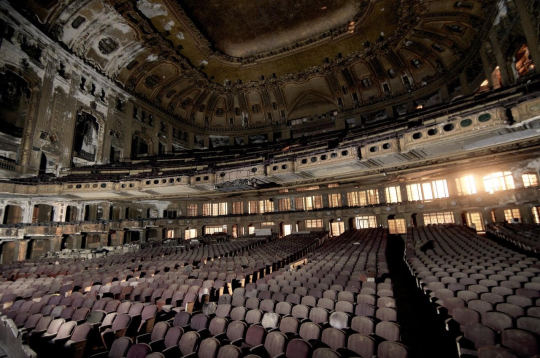

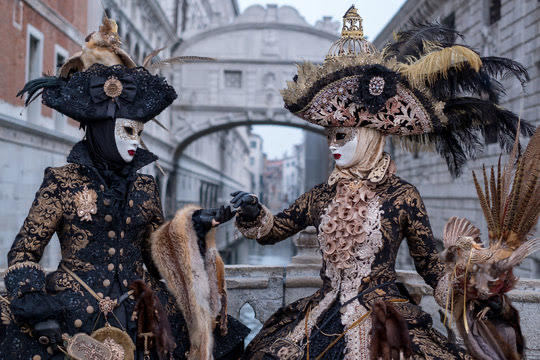

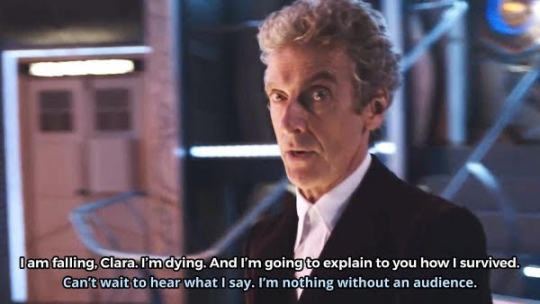

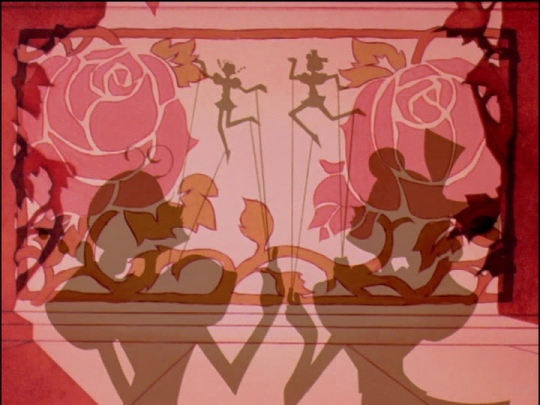

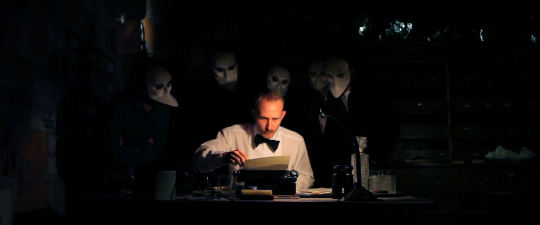
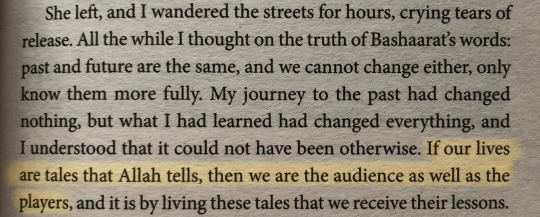
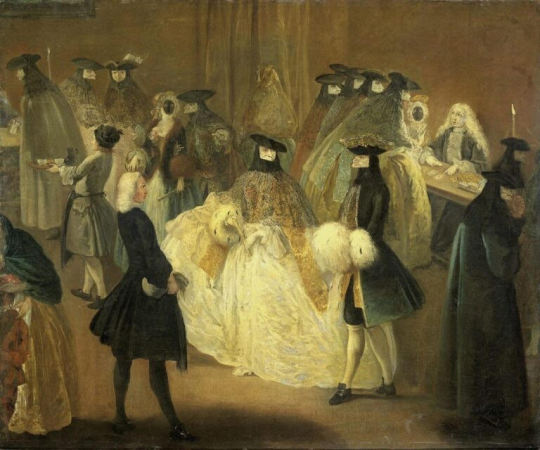


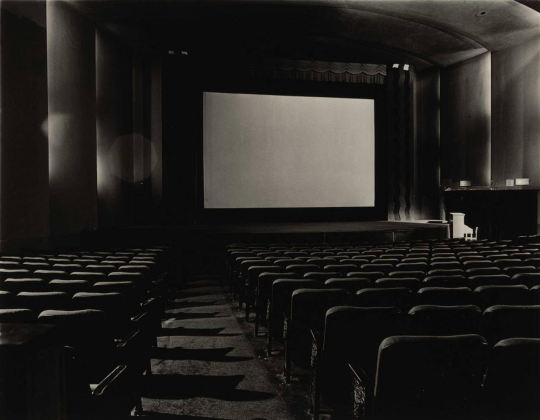
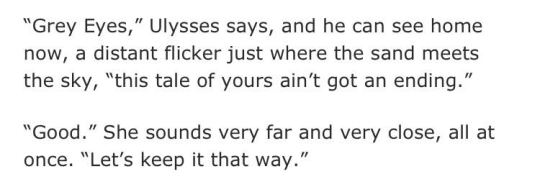
All the world’s a stage
Shakespeare, As You Like It / Filth City, The Baroque Theatre / Grayling, Berkeley’s argument for immaterialism / Venice Carnival / sam sax, Hydrophobia / Doctor Who (2005-present) / Hannah Arendt, The Human Condition (1958) / Revolutionary Girl Utena (1997) / Punchdrunk, Sleep No More (2011-2024) / Ted Chiang, The Merchant and the Alchemist’s Gate / Pietro Longhi, Il ridotto (1720-1790) / Charlotte Riley, Why history should always be rewritten (2021) / Terry Pratchett, Hogfather / Diane Arbus, Empty Movie Theater (1971) / cyanocorax, i won’t be going gentle
#web weave#web weaving#thought too much about Berkeley and ended up with this#something about how the act of perceiving brings us into existence#so life becomes a performance in which we are both playing and watching#creating the world and being created#poetry#time#philosophy#punchdrunk#rgu#revolutionary girl utena#weird mix of media i guess but it makes sense in my head
16 notes
·
View notes
Note
you are so fucking right about babies. baby naps are hardcore the most cutest naps ever. i love babies i feel like that’s an unpopular around here but they’re just so cute. anyway real footage of me anytime i see a baby

REALLLL ME TOOOO!!! I’m always just like. holy shit a baby. holy shit ur so small. dude I hate to alarm you but um. did u know ur so small. like. are you aware that you are in fact just a little guy. itty bitty even. and the baby’s just like: 👁👄👁
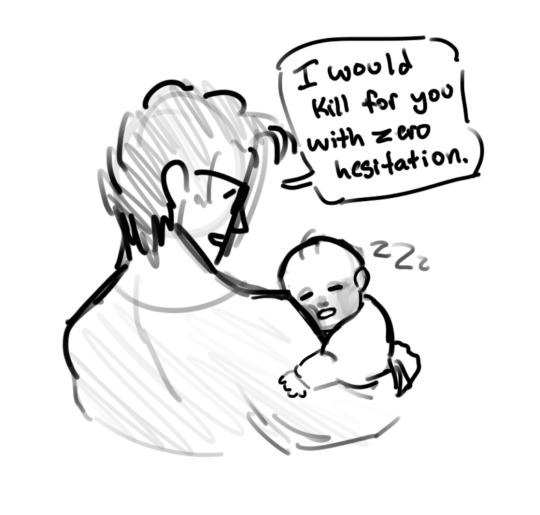
anyways this is a real image of me at work every Saturday
#mr wiggles my absolute fucking beloved. the cutest fucking little guy ever#fr tho I don’t get why so many ppl on tumblr are so fucking mean to kids like 😭😭#I get that society has made you absolutely exhausted of the way we’re all expected to have kids and treat them like miracles but also.#babies are actually cute and special unfortunately. like they actually are sick as hell if u give them a chance.#I know not everyone wants a baby but I feel like the mere concept of the way children perceive the world fits in very well with the tumblr -#- populations general philosophy of romanticism and enjoying little experiences in life#idk. maybe I think about things too much. but that’s just my thought#ask box#anyways I would kill fifty armed men in cold blood for even my least favorite kids at work and that is a promise#they may drive me crazy but I would take a bullet for them without hesitation#doodles
13 notes
·
View notes